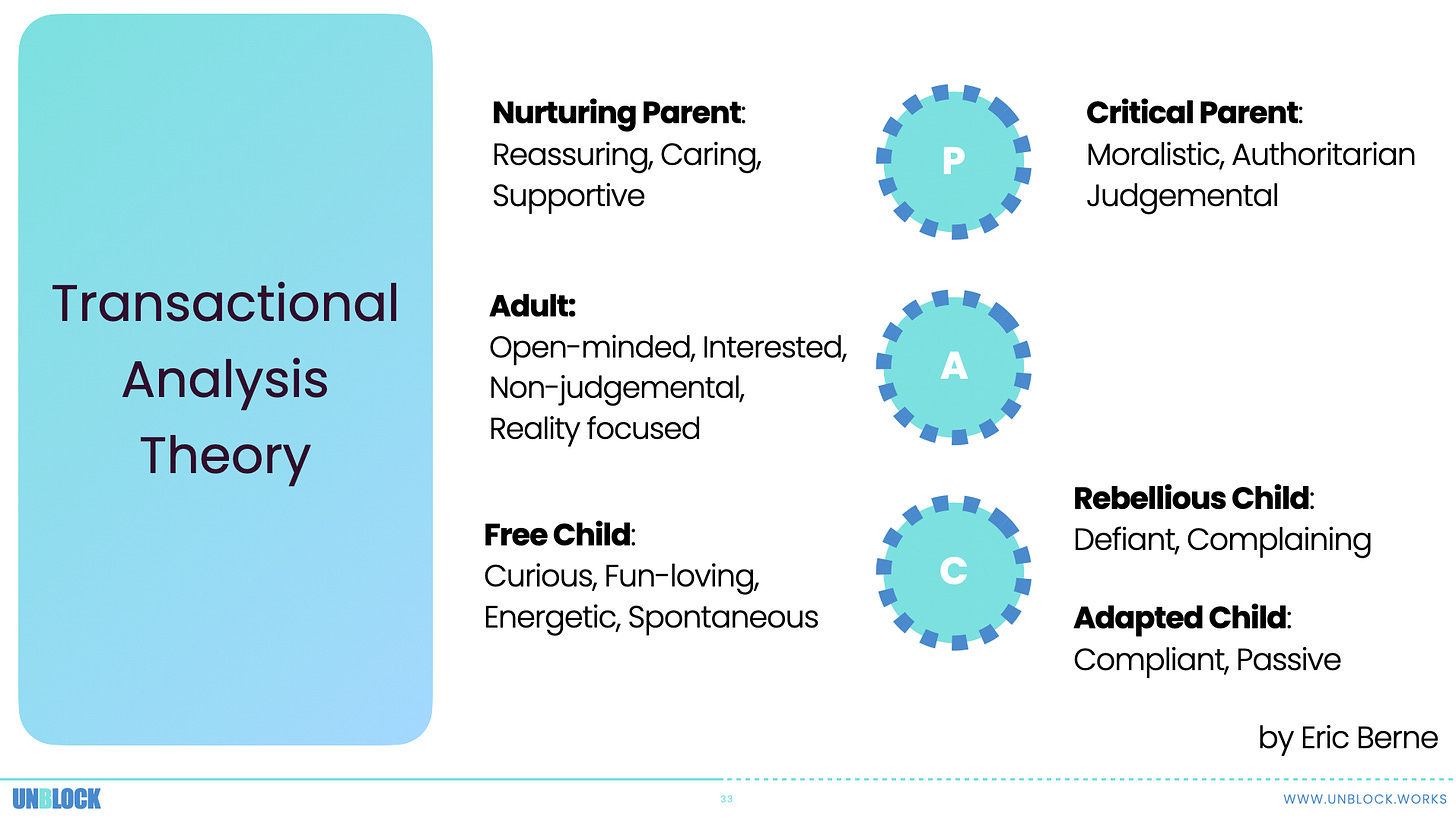Can we talk to each other as adults, please?
How better conversations create ownership, reduce friction, and accelerate strategy execution.
Most strategy execution failures begin long before the work does: they start with how people talk to each other. The fastest way to fix them is a 60-year-old psychology model almost no leaders use…
We’ve all seen it happen:
A leader fires off an angry comment, and a team member instantly shrinks: “Okay, I’m sorry, I’ll fix it, I promise.”
An overwhelmed team member looks lost, and without asking, the leader 'rescues’ them like a helicopter parent: “I’ll take over from here and do it.”
A team member raises a valid concern, and someone snaps back with a sarcastic comment… And the discussion dies.
Before anyone notices, the whole team slips into a familiar triangle:
The one who lost all hope: “Why does this keep happening to me?”
The one who points fingers: “This should never have happened.”
The one who solves everything despite not having the time: “Fine, I’ll do it.”
Under pressure, people stop responding from clarity and start responding from emotion. Meetings get political. Decisions get personal. Ownership evaporates. Everyone works harder… but progress stalls.
Transactional Analysis
These aren’t personality flaws; they’re predictable psychological patterns. And that’s exactly what Transactional Analysis (TA) makes visible. TA says every person operates from one of three ego states at any moment:
👆 Parent
Learned behaviours, rules, judgments.
Can be Nurturing (“Let me help you”) or Critical (“You should have known better!”).
🧑 Adult
Calm, pragmatic, here-and-now (“What do we know? What’s next?”)
This is where good leadership and collaboration happen.
👇 Child
Reactive, defensive, overwhelmed, or playful and creative.
Can be Free (creative, spontaneous) or Adapted (people-pleasing, anxious), or Rebellious (pushing back, resisting, eye-rolling).
Leaders who recognise which state they’re in (and which state their team is in) instantly gain more influence and speed.
A TA rule of thumb:
Dysfunction at work happens when people STOP speaking “Adult to Adult.”
When someone reacts emotionally, TA encourages leaders to ask:
Which ego state am I in?
Which ego state are they in?
What does the conversation need?
Stay in Adult. Invite others into Adult. Repair quickly when you slip.
Below are five TA-based leadership practices that helps you unblock your team and accelerate results.
1/ Start strategic conversations by pulling everyone into Adult mode.
In high-pressure environments, Adult mode is the first thing to disappear, and the first thing leaders must restore. Here is how to reset the room:
Name the decision and the outcome you’re trying to achieve.
Clarify what is known and what is assumed.
Set shared expectations for how you want to engage: calm, factual, here-and-now.
Slow down the pace so people stop reacting from emotion.
Why this matters: Adult mode is where alignment and real progress begin.
2/ Interrupt Parent–Child dynamics the moment they appear.
A timeline slips, someone feels exposed, and suddenly what was Adult-to-Adult becomes Parent-to-Child. People fall into shrinking, snapping, apologizing, or rescuing, which derails execution. You can reset by asking:
“What decision can you make right now?”
“What support do you actually need?”
“What is the smallest safe-to-try next step?”
These questions return agency to the team and stop you from becoming the bottleneck.
Why this matters: Execution accelerates when dependency disappears and ownership returns.
3/ Use the Drama Triangle to stop emotional loops before they spiral.
The Victim, Persecutor, and Rescuer roles described in the introduction are predictable—and reversible. Shift from the drama triangle to the high-performance alternatives:
Creator → focuses on what they want to create and takes responsibility (“What do I want here?”).
Challenger → brings constructive tension (“What problem are we really solving?”).
Coach → strengthens thinking without taking over (“What options do you see?”).
These three roles shift teams from reacting to creating, from blaming to learning, from rescuing to growing. It prevents learned helplessness and builds genuine ownership.
Why this matters: Strategy moves faster when teams replace drama for responsibility.
4/ Use feedback to restore Adult-to-Adult collaboration.
When people slip into emotion, feedback is how you bring the conversation back:
Describe what you observed without judgment.
Ask what the other person intended.
Agree on one forward action.
Close the loop.
Why this matters: Without honest conversation, misalignment compounds and execution drifts.
5/ Give clear mandates that prevent both rescuing and rebellion.
When leaders over-help, people collapse into Adapted Child. When leaders under-communicate, people slip into Rebellious Child. Increasing clarity prevents both.
Define decision rights.
Make boundaries explicit.
Share the trade-offs that matter.
Clarify when you need to be involved.
Why this matters: Strategy execution thrives on distributed judgment, not centralized approval.
Notice the pattern? TA doesn’t fix strategy; it fixes the conditions under which strategy can succeed: clarity, ownership, psychological safety, and high-quality conversations.
If you want faster execution, review how your team communicates when the pressure is highest. Because when conversations elevate, performance elevates.
TA gives you more than a framework. It gives you a way of leading that brings people back to clarity, ownership, and courage. When you stay in Adult—and invite others there—you create teams that think boldly, decide wisely, and move with real momentum.
Better conversations build better organizations. Speak to people as adults, especially when it’s hardest. That’s how strategy finally comes to life.
In other news
A few other fun things that happened last month:
My newsletter hit 1,000 subscribers, yay! 🥳 Thanks, everyone, for being here.
We took an executive team inside the Red Bull Racing factory. 🏎️💨
I reduced my time spent scrolling social media by over 50% Read how.
That’s all for today. I hope you enjoyed it. Simply hit ‘reply’ or comment—I read every message. Have a great day! ❄️





